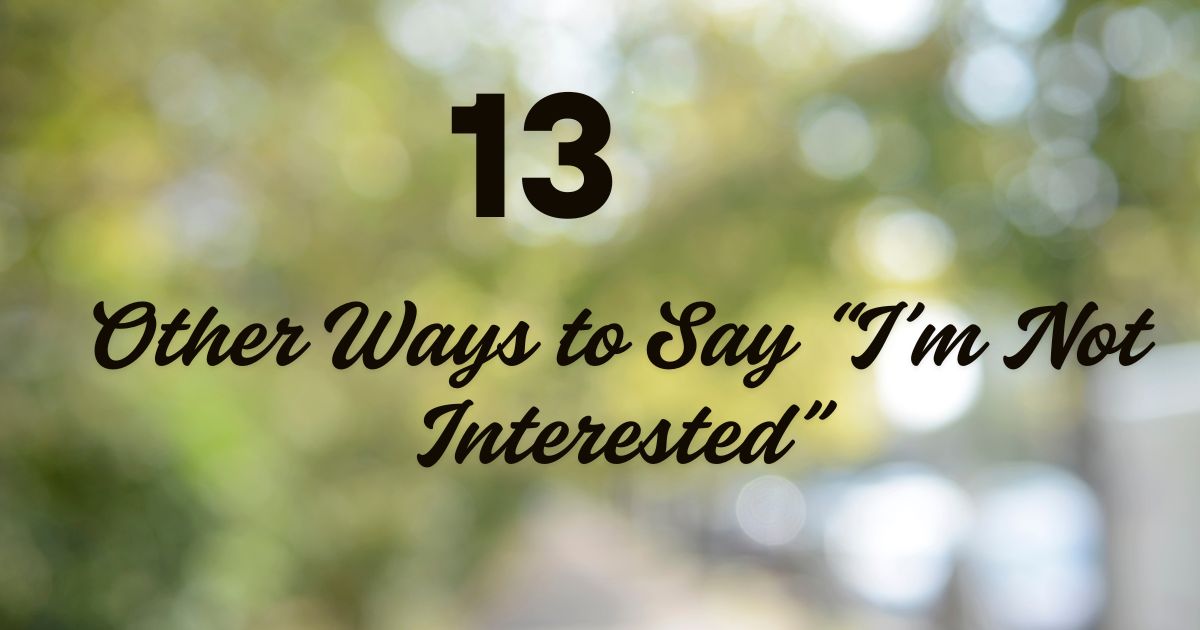Sometimes, saying “I’m Not Interested” can feel awkward, but there’s a way to do it politely without sounding dismissive. Whether it’s a suggestion, an offer, or an invitation, communicating disinterest gracefully is key to maintaining respect and positive relationships. You don’t have to be blunt or harsh. In fact, there are many alternatives that allow you to express your feelings while being considerate.
Instead of simply saying, “I’m Not Interested,” you can soften your response with kindness or offer a reason. This way, you still acknowledge the other person’s effort without dismissing them. Clear, yet thoughtful communication shows respect for both yourself and the person making the offer. After all, it’s about keeping connections intact, even when turning something down. Let’s explore how you can decline gracefully without hurting anyone’s feelings.
Other Ways to Say “I’m Not Interested”
When it comes to politely turning something down, especially in professional or social contexts, finding the right words is crucial to maintaining good relationships. The phrase “I’m Not Interested” can sometimes come across as blunt or dismissive, so using more nuanced expressions can help soften the message while still being clear. Phrases like “I’ll pass this time,” “That doesn’t quite resonate with me,” or “I appreciate the thought, but it’s not for me” offer a more tactful way to decline an invitation, offer, or proposal.
Gentle Declines
Gentle declines allow you to politely refuse an offer without causing offense. Phrases like “I appreciate the offer, but I’ll have to pass” or “Thank you, but it’s not quite what I’m looking for” help communicate your disinterest while maintaining respect, empathy, and professionalism in various contexts.
1. “It doesn’t quite resonate with me”
Example: “While I appreciate the concept, it doesn’t quite resonate with me.”
Meaning: This phrase gently communicates that the topic or proposal does not align with your personal tastes or interests, implying a subjective preference rather than a negative judgment.
Usage: Suitable for professional settings or discussions about creative projects where you want to provide feedback without discouraging the other party.
2. “I’ll pass this time”
Example: “Thank you for the offer, but I’ll pass this time.”
Meaning: A casual and polite way of declining an offer or invitation, indicating that while you appreciate the thought, you’re not interested at the moment.
Usage: Ideal for social gatherings or casual settings where you want to politely refuse without providing a detailed explanation.
3. “I’m not the best fit for this”
Example: “I think I’m not the best fit for this project, but I appreciate the opportunity.”
Meaning: A tactful way of expressing that you’re not the right person for a particular role, task, or opportunity, highlighting your self-awareness without disrespecting the offer.
Usage: Perfect for job offers, collaborative projects, or volunteer work where you want to decline while still maintaining a professional tone.
4. “That doesn’t quite spark my interest”
Example: “I appreciate the idea, but it doesn’t quite spark my interest.”
Meaning: A polite way to express that the offer or subject matter doesn’t ignite enthusiasm or curiosity for you, indicating disinterest without harsh rejection.
Usage: Works well in professional and social settings, particularly when discussing offers, proposals, or activities that don’t appeal to you.
5. “I appreciate the thought, but it’s not for me”
Example: “Thank you for thinking of me, but it’s not something I’m looking for right now.”
Meaning: This phrase acknowledges the kindness behind the offer or invitation but politely declines, emphasizing that it’s simply not a match for your current needs or interests.
Usage: Useful for professional or social situations where you want to show gratitude for an offer or suggestion but feel it doesn’t align with your priorities.
Subtle Refusals
Subtle refusals offer a tactful way to decline without directly saying “no.” Phrases like “I’m not sure this aligns with my current focus” or “This isn’t quite the right fit for me right now” allow you to express disinterest without sounding dismissive, ensuring the conversation stays respectful and positive.
6. “I have different priorities at the moment”
Example: “I have different priorities at the moment, but thank you for considering me.”
Meaning: This phrase politely communicates that other commitments or goals are taking precedence over the current offer or proposal, emphasizing that your focus is elsewhere.
Usage: Perfect for both professional and personal contexts when you want to decline an invitation or opportunity while signaling that you are focused on other important tasks.
7. “I’m not as passionate about this as I’d need to be”
Example: “I appreciate the offer, but I’m not as passionate about this as I’d need to be to commit fully.”
Meaning: This phrase communicates that the topic or project doesn’t excite you enough to give it the dedication or enthusiasm required, gently declining without seeming dismissive.
Usage: Suitable for situations where you may not have the enthusiasm or interest required for a job offer, proposal, or project, but still want to express gratitude.
8. “I’m currently exploring other directions”
Example: “Thank you for the suggestion, but I’m currently exploring other directions right now.”
Meaning: A way to politely decline by stating that you are already focused on different projects or pursuits, indicating that you’re not currently open to new opportunities.
Usage: Ideal for professional environments when you want to show that you are already committed to other tasks or commitments, without sounding dismissive of the offer.
9. “My plate is quite full at the moment”
Example: “I’d love to, but my plate is quite full at the moment with other commitments.”
Meaning: This phrase politely indicates that you are too busy to take on anything else, implying that your schedule or responsibilities are already overwhelming.
Usage: Works well in both professional and personal settings when you want to decline a new task, project, or invitation without seeming uninterested or unwilling.
Politely Declining
Politely declining involves expressing gratitude while turning down an offer. Using phrases such as “I truly appreciate the offer, but I’m going to have to pass” or “Thank you for considering me, but it’s not something I can commit to right now” shows respect and tact while maintaining professionalism.
10. “Thank you for thinking of me, but I’ll have to decline”
Example: “Thank you for thinking of me, but I’ll have to decline the invitation this time.”
Meaning: This phrase expresses gratitude for the consideration, while politely declining without offering too much detail. It shows respect and appreciation for the other person’s thoughtfulness.
Usage: Suitable for both professional and social settings when you want to decline an offer or invitation while maintaining a friendly and respectful tone.
Read More: 12 Other Ways to Say “I’m With You”
11. “I appreciate the offer, but it’s not something I’m looking for right now”
Example: “I appreciate the offer, but it’s not something I’m looking for right now. I’ll have to pass.”
Meaning: This phrase politely acknowledges the offer or opportunity, but communicates that it doesn’t align with your current needs or interests, emphasizing a subjective preference.
Usage: Perfect for situations where you want to decline a proposal, job offer, or invitation without appearing disinterested or rude, while clearly communicating your focus is elsewhere.
12. “I’m honored but must respectfully decline”
Example: “I’m honored by your invitation, but I must respectfully decline due to prior commitments.”
Meaning: This phrase conveys respect and appreciation, acknowledging the offer or opportunity, while gently indicating that you are unable to accept it for personal or professional reasons.
Usage: Ideal for formal settings, such as business interactions or formal invitations, where you want to convey your gratitude and respect but need to decline.
13. “It’s not quite what I’m seeking at the moment”
Example: “Thank you for the suggestion, but it’s not quite what I’m seeking at the moment.”
Meaning: This phrase politely communicates that the offer or idea doesn’t meet your current needs, desires, or goals, implying a more refined, subjective preference.
Usage: Useful for both casual and professional situations when you want to respectfully turn down a proposal, product, or opportunity without suggesting any negative judgment.
When to Use Different Expressions of Disinterest
Knowing when to use different expressions of disinterest is crucial for maintaining respect and clarity. Use gentle declines for casual settings, subtle refusals for personal connections, and polite rejections in professional environments. When prioritizing commitments or focusing on personal growth, it’s best to be clear yet considerate with your response.
casual Settings with Friends and Family
In casual settings with friends and family, you can politely decline using friendly, easygoing phrases like, “Thanks, but I’ll pass this time” or “I’m going to skip this one, but I appreciate the invite.” These responses maintain the warmth of the relationship while subtly communicating your lack of interest.
Professional Environment
In a professional environment, polite refusals need to maintain respect and professionalism. Phrases such as, “I’m honored by the offer, but I must respectfully decline” or “I appreciate the opportunity, though it doesn’t align with my current goals” convey gratitude while keeping boundaries clear in work settings.
When Prioritizing Time and Commitments
When you need to prioritize time and commitments, you can use responses like, “My schedule is full right now, but I appreciate your offer” or “I’m focusing on other priorities at the moment, thank you for understanding.” These phrases show respect for both your own time and the other person’s offer.
Personal Growth and Exploration
For personal growth and exploration, turning down invitations or offers can be framed as a way of focusing on your goals. You might say, “I’m currently focusing on personal growth, so I’ll have to decline” or “I’m exploring new paths right now, but I appreciate the offer.” This highlights your commitment to growth and self-improvement.
Conclusion
In conclusion, saying “I’m Not Interested” doesn’t have to be harsh. There are many ways to express disinterest politely. Whether it’s a suggestion, an offer, or an invitation, using kinder phrases can help you decline without causing offense. Always remember, it’s not just about what you say, but how you say it.
If you want to politely decline, try softer expressions. Instead of just saying, “I’m Not Interested,” offer a reason or show appreciation. This helps maintain good relationships while being firm about your feelings. “I’m Not Interested” can be a respectful response when said with care. Being considerate of others’ feelings will always make your communication smoother. It’s all about showing respect, while also honoring your own boundaries. So next time you need to say “I’m Not Interested,” do it thoughtfully.

Grammerroot is your trusted source for mastering English grammar and language skills. From simple rules to advanced tips, we help learners build strong foundations through easy-to-understand content. Learn smart, learn right — only at Grammer Root.




